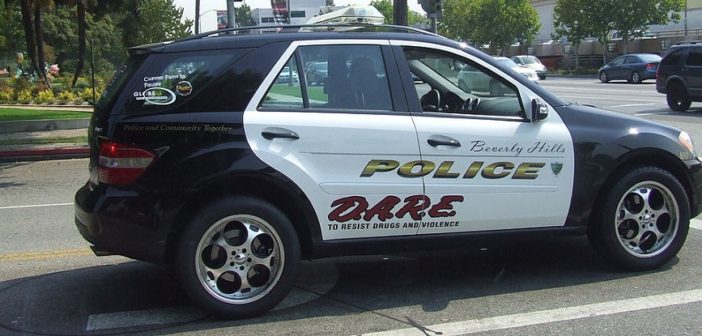 A recent article in Vice focuses on seven drug addicts who went through the D.A.R.E program, asking them how they feel it affected (or didn’t affect) their eventual addiction. The author of the piece, Brittany Malooly, makes her feelings clear when she opens with a few paragraphs on the statistical failure of the anti-drug curriculum. She goes as far as to imply that despite funding and governmental support, the D.A.R.E program has—overall—flopped on its responsibility to help prevent addiction.
A recent article in Vice focuses on seven drug addicts who went through the D.A.R.E program, asking them how they feel it affected (or didn’t affect) their eventual addiction. The author of the piece, Brittany Malooly, makes her feelings clear when she opens with a few paragraphs on the statistical failure of the anti-drug curriculum. She goes as far as to imply that despite funding and governmental support, the D.A.R.E program has—overall—flopped on its responsibility to help prevent addiction.
Education Not Treatment
I have no idea if Malooly is sober or not—she says in another piece that she “stopped partying” but that can mean all sorts of different things to different people. Still, her introduction to these interviews exemplifies the disconnect between the disease of alcoholism/addiction and society’s understanding of it. An anti-drug program like D.A.R.E can’t be expected to prevent addiction; it is merely a source for information on the consequences of drug and alcohol abuse. And information has never prevented anyone from having the disease of addiction. Images of blackened lungs and cirrhotic livers don’t change the internal restlessness of a budding alcoholic. People don’t lose control of their drinking and drug use because they didn’t have a “good drug education”; they lose control because they have alcoholism.
The Wrong Audience
I suppose it could be argued that D.A.R.E should prevent young, genetically disposed addicts from ever picking up that first drink or drug, therein avoiding the rabbit hole of their addiction. Scientifically this makes sense. It’s also completely unrealistic. I would have sawed my own fingers off with a nail file in high school if I thought it would have helped me fit in. There was nothing you could have told me in high school to get me to not try alcohol and drugs. When you are like me, desperate for friends, you gravitate towards the lowest hanging fruit; and no fruit hangs lower than a bunch of druggies too high to be able to tell that no one else at school likes you. Out of the seven addicts who were interviewed, two admitted that D.A.R.E couldn’t have helped them for that reason.
With the exception of a chick who goes by the (I am sure God-given) name of “Shorty,” most of the addicts Malooly talked to didn’t seem to blame D.A.R.E for their drug addiction but rather felt like they just didn’t connect to it because it was taught by authority figures or it didn’t apply to their lives at the time. And that is a valid point; it’s hard to use mortality scare tactics on middle-schoolers who don’t fully understand that they are mortal. I was 25 the first time I realized I could actually die.
Knowledge is Still Power
Does this mean schools shouldn’t offer drug awareness problems? Hell no. Regardless of how disappointed the people who went through D.A.R.E and still became crack heads are, programs about the dangers of drugs are vital for public awareness, social dialogues and educating people so they can make informed decisions. There are less pedantic, more cutting edge offerings these days than D.A.R.E.—AfterParty even offers one. The point is that even if teens ultimately decide to smoke meth, at least with some education, they can’t say they had no idea what they were getting into.
Courtesy of Simon_sees from Australia (Beverly Hills Cop Uploaded by russavia) [CC BY 2.0 (https://creativecommons.org/licenses/by/2.0)], via Wikimedia Commons
Sponsored DISCLAIMER: This is a paid advertisement for California Behavioral Health, LLC, a CA licensed substance abuse treatment provider and not a service provided by The Fix. Calls to this number are answered by CBH, free and without obligation to the consumer. No one who answers the call receives a fee based upon the consumer’s choice to enter treatment. For additional info on other treatment providers and options visit www.samhsa.gov.




